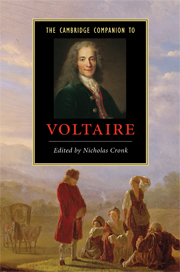Book contents
- Frontmatter
- Introduction
- 1 The making of a name: a life of Voltaire
- 2 Voltaire and authorship
- 3 Voltaire: philosopher or philosophe?
- 4 Voltaire and clandestine manuscripts
- 5 Voltaire and the myth of England
- 6 Voltaire’s masks: theatre and theatricality
- 7 Voltaire as story-teller
- 8 Candide
- 9 Voltaire and history
- 10 Voltaire’s correspondence
- 11 Voltaire: pamphlets and polemic
- 12 Voltaire and the politics of toleration
- 13 Voltaire and the Bible
- 14 The Voltaire effect
- Further reading
- Index
3 - Voltaire: philosopher or philosophe?
Published online by Cambridge University Press: 28 May 2009
- Frontmatter
- Introduction
- 1 The making of a name: a life of Voltaire
- 2 Voltaire and authorship
- 3 Voltaire: philosopher or philosophe?
- 4 Voltaire and clandestine manuscripts
- 5 Voltaire and the myth of England
- 6 Voltaire’s masks: theatre and theatricality
- 7 Voltaire as story-teller
- 8 Candide
- 9 Voltaire and history
- 10 Voltaire’s correspondence
- 11 Voltaire: pamphlets and polemic
- 12 Voltaire and the politics of toleration
- 13 Voltaire and the Bible
- 14 The Voltaire effect
- Further reading
- Index
Summary
For one historian of ideas, Isaiah Berlin, Voltaire is 'the central figure of the Enlightenment'; while for another, John Gray, 'Voltaire's writings on philosophical questions are unoriginal to the last degree . . . Few of the entries in his Philosophical Dictionary are concerned with philosophical questions.' The problem lies in part with the word philosophique, which Gray here (perhaps mischievously) misunderstands. The French word philosophe is not easily translated into English: in the specific context of the eighteenth century, it refers to those authors - Montesquieu, Voltaire, Jean-Jacques Rousseau, Diderot - who through their writings helped popularise the Enlightenment values of reason, empiricism, toleration and humanity. More broadly, the French word can also refer to any philosopher, such as Descartes or Kant. The ambivalence of the term reflects an ambivalence in our image of Voltaire. Is he an original philosophical thinker? Or is he simply a vulgariser and publicist for the thought of others?
On the one hand, Voltaire was the first to admit that he was no analytical philosopher: to his friend Thiriot, he wrote in 1760 that 'I have never pretended to have an orderly mind like a Newton or a Rameau. I would never have discovered the root of the chord or integral calculus' ('Je n'ai jamais prétendu avoir une tête organisée comme un Newton, un Rameau. Je n'aurais jamais trouvé la basse fondamentale ni le calcul intégral', D9489). Voltaire is no Locke, no Newton: but in the Lettres philosophiques he did play a decisive role in introducing both those thinkers to a wide European audience. His skills as a writer and as a publicist of ideas mean that he did perhaps more than any other single author to shape the course of Enlightenment thought.
- Type
- Chapter
- Information
- The Cambridge Companion to Voltaire , pp. 47 - 64Publisher: Cambridge University PressPrint publication year: 2009
- 4
- Cited by

